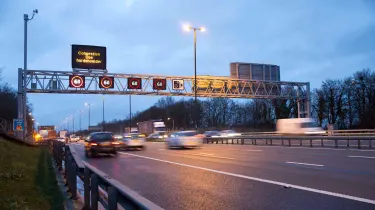
Journey times on major roads across the UK have significantly increased in the past year, with delays lengthening by an average of 11 per cent in just 12 months to well above pre-pandemic levels.
New data released by the Department for Transport shows that the mean delay across the Strategic Road Network (SRN) – which encompasses 4,500 miles of motorways and A-roads managed by National Highways – grew to 11 seconds per mile between June 2023 and June 2024, representing an 11.1 per cent increase year-on-year.
The average speed driven on SRN tarmac dropped by 1.9 per cent in that period to 56.5mph – the slowest it’s been in over 10 years – pushing up average journey times.
Meanwhile, speeds on ‘local’ A-roads – those not managed by National Highways – dropped by around one per cent year-on-year to just 23.6 mph, with the average length of delay rising by a single percentage point.
This means that if you’re held up on a local A- road, there’s an average delay of 45.7 seconds per mile compared with free-flowing traffic.
The RAC’s head of policy, Simon Williams, described the DfT statistics as “worrying, considering the number of miles travelled by road haven’t quite returned to pre-pandemic levels”.
The rise in delay times comes despite data which shows there are now marginally fewer cars on the road than before the pandemic.
SRN delays were around nine seconds per mile in the year leading up to June 2019 – roughly 18 per cent better than today’s figures. In addition, the average speed travelled across the SRN was 59mph in 2019, some 2.5mph faster than in 2024.
Williams continued: “Whatever the cause, delays can be frustrating and costly, so we look forward to further details from the Government about where it is focusing its road spending for the duration of this Parliament.”
At the upcoming Autumn Budget, the Government is widely expected to remove the five pence cut to fuel duty. Prior to the General Election, now-Transport Secretary, Louise Haigh, told Auto Express that Labour plans to “fix up to a million more potholes every year by redirecting existing road funding, saving drivers hundreds of pounds in lower repair costs”. Haigh also promised to “provide councils with long-term funding settlements so roads are fixed for the long-term”.
